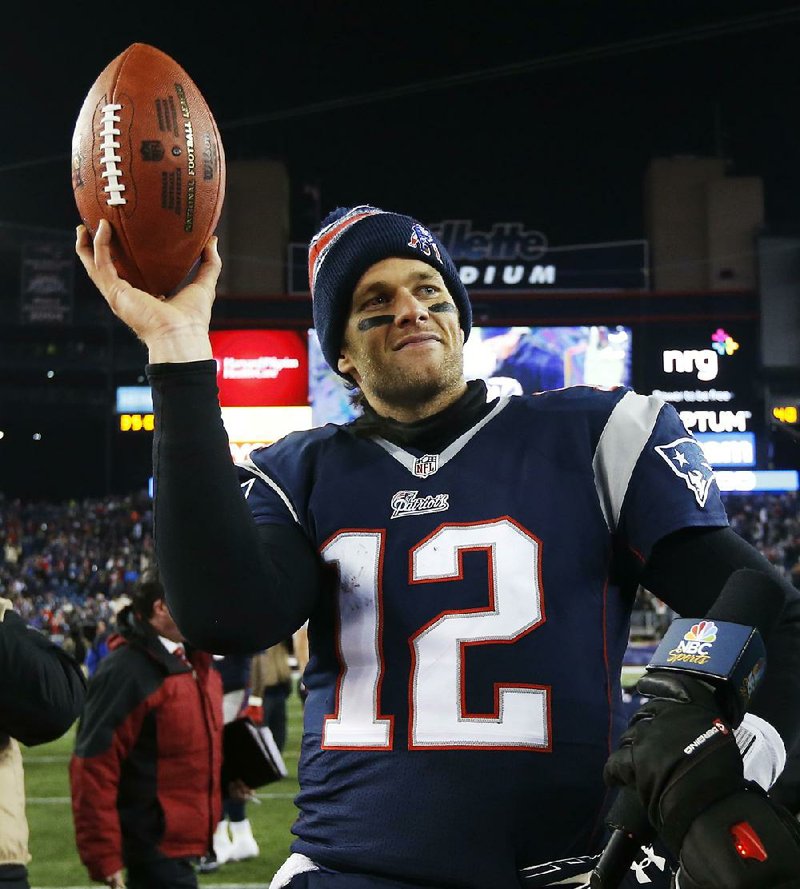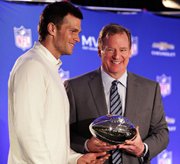NEW YORK -- Tom Brady's four-game suspension for his role in using underinflated footballs during the AFC Championship Game has been upheld by NFL Commissioner Roger Goodell.
The league announced the decision Tuesday, with Goodell saying that the New England quarterback told an assistant to destroy Brady's cellphone on or just before March 6. Brady met with independent investigator Ted Wells on that day.
Commissioner Roger Goodell’s comments
NEW YORK — Excerpts from NFL Commissioner Roger Goodell’s decision to uphold New England Patriots quarterback Tom Brady’s four-game suspension:
CONCLUSION
“Notwithstanding my enormous respect for his accomplishments on the field and for his contributions and role in the community, I find that, with respect to the game balls used in the AFC Championship Game and the subsequent investigation, Mr. Brady engaged in conduct detrimental to the integrity of, and public confidence in, the game of professional football.”
EVIDENCE
“In short, the available electronic evidence, coupled with information compiled in the investigators’ interviews, leads me to conclude that Mr. Brady knew about, approved of, consented to, and provided inducements and rewards in support of a scheme by which, with Mr. Jastremski’s support, Mr. McNally tampered with the game balls.”
“Mr. Brady’s affirmative action to ensure that this information would not be available leads me to conclude that he was attempting to conceal evidence of his personal involvement in the tampering scheme, just as he concealed for months the fact that he had destroyed the cellphone requested by investigators.”
REASONING FOR PUNISHMENT
“In terms of the appropriate level of discipline, the closest parallel of which I am aware is the collectively bargained discipline imposed for a first violation of the policy governing performance enhancing drugs; steroid use reflects an improper effort to secure a competitive advantage in, and threatens the integrity of, the game.”
— The Associated Press
"He did so even though he was aware that the investigators had requested access to text messages and other electronic information that had been stored on that phone," Goodell said in his decision.
"During the four months that the cellphone was in use, Brady had exchanged nearly 10,000 text messages, none of which can now be retrieved from that device."
Calling the appeal process "a sham," Tom Brady's agent, Don Yee, said Goodell "failed to ensure a fair process" in upholding the quarterback's four-game suspension.
Brady said in his testimony he was aware of investigators' request for information from the cellphone before he had it destroyed, the appeal decision said.
Wells said -- after releasing the report in May -- that he had told Brady and Yee he did not need to see his phone and would have accepted a list of communications.
Wells' investigation had no subpoena power and Brady was under no legal obligation to cooperate.
The NFL had some messages from Brady sent to an equipment manager's phone, but investigators wanted to see if Brady's cellphone had other messages related to footballs.
Brady, a four-time Super Bowl-winning quarterback, was suspended by NFL executive Troy Vincent in May after the Wells report. The Patriots were fined $1 million and lost two draft picks. The team didn't appeal its penalty, but Brady appealed.
The NFL Players Association had said previously it would challenge the decision in court if Brady's suspension wasn't erased. The union said in a statement on Tuesday that it would appeal, but it wasn't immediately clear in what venue.
Moments after announcing Goodell's decision, the league filed action in U.S. District Court in New York against the union, saying the NFL commissioner has the right under the labor agreement to hand out such discipline "for conduct that he determines is detrimental to the integrity of, or public confidence in, the game of professional football."
Goodell said exactly that in the conclusion of his appeal decision.
"Especially in light of the new evidence introduced at the hearing -- evidence demonstrating that he arranged for the destruction of potentially relevant evidence that had been specifically requested by the investigators -- my findings and conclusions have not changed in a manner that would benefit Mr. Brady," Goodell said.
Yee said that Brady's side was given only four hours to present a defense, and when he asked for documents from Wells, that request was rejected on the basis of privilege.
"We therefore had no idea as to what Wells found from other witnesses, nor did we know what those other witnesses said," Yee said.
Yee said the electronic data presented in Brady's defense was ignored during the appeal hearing.
Brady and the Patriots have denied knowingly using deflated footballs in the AFC title game victory over Indianapolis. The Patriots went on to beat Seattle in the Super Bowl and Brady was the MVP.
The NFL announced in late January that Wells would head an investigation into New England's use of underinflated balls against the Colts. More than three months later, the 243-page Wells report was issued, saying it was "more probable than not" that Brady was "at least generally aware" that footballs he used were improperly deflated by team personnel.
Brady appealed and the union asked Goodell to recuse himself from hearing the appeal because he could not be impartial and might be called as a witness. But Goodell said it was his responsibility to oversee the hearing to protect the integrity of the league.
Scientific arguments were a major part of Brady's defense. Brady's lawyers tried to shoot down the findings of an independent firm hired to provide scientific analysis of the air pressure inside the footballs used by the Patriots and Colts.
Brady, who turns 38 on Aug. 3, took nearly every snap last season. But he'll miss the first four games this season unless the case goes to court. Jimmy Garoppolo, a second-round pick in 2014, would replace Brady, the two-time NFL MVP and three-time Super Bowl MVP.
New England hosts Pittsburgh on Sept. 10 to open the regular season. It then goes to Buffalo, hosts Jacksonville, has a bye, and is at Dallas in the last game of Brady's suspension. Brady would return against, yes, the Colts on Oct. 18 in Indianapolis.
Sports on 07/29/2015


